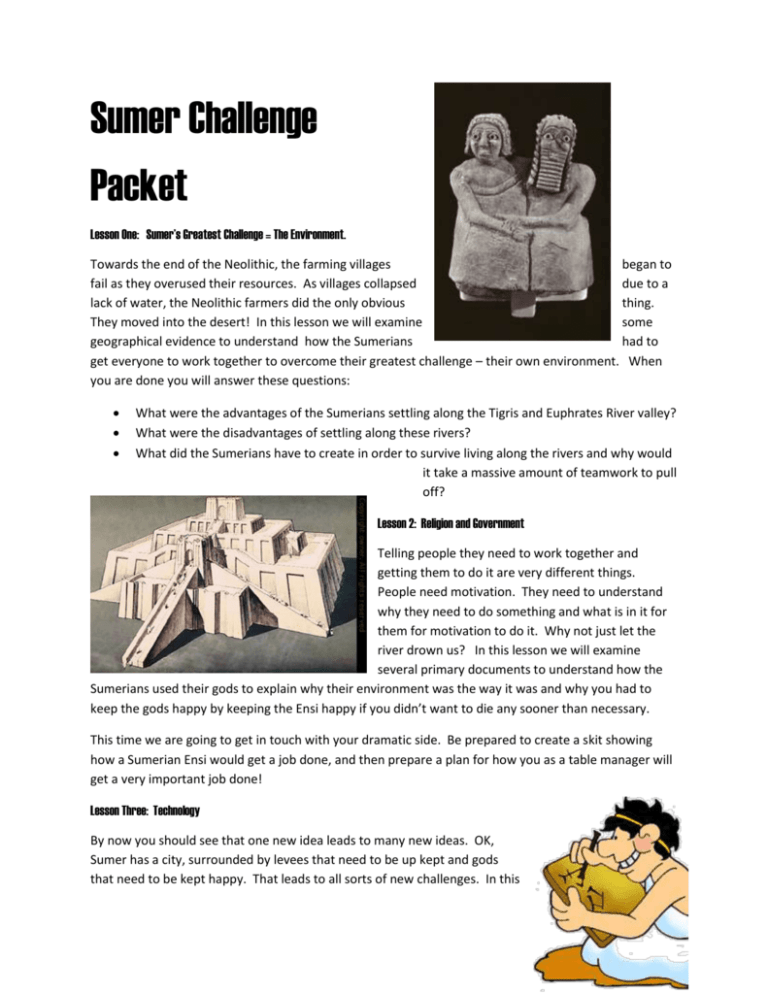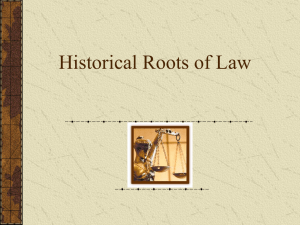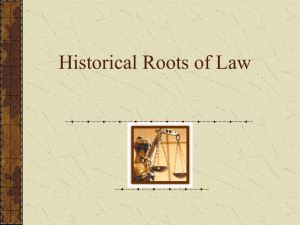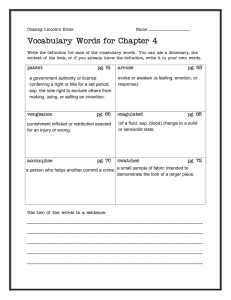Sumer Challenge Packet Lesson One: Sumer's Greatest Challenge
advertisement

Sumer Challenge Packet Lesson One: Sumer’s Greatest Challenge = The Environment. Towards the end of the Neolithic, the farming villages began to fail as they overused their resources. As villages collapsed due to a lack of water, the Neolithic farmers did the only obvious thing. They moved into the desert! In this lesson we will examine some geographical evidence to understand how the Sumerians had to get everyone to work together to overcome their greatest challenge – their own environment. When you are done you will answer these questions: What were the advantages of the Sumerians settling along the Tigris and Euphrates River valley? What were the disadvantages of settling along these rivers? What did the Sumerians have to create in order to survive living along the rivers and why would it take a massive amount of teamwork to pull off? Lesson 2: Religion and Government Telling people they need to work together and getting them to do it are very different things. People need motivation. They need to understand why they need to do something and what is in it for them for motivation to do it. Why not just let the river drown us? In this lesson we will examine several primary documents to understand how the Sumerians used their gods to explain why their environment was the way it was and why you had to keep the gods happy by keeping the Ensi happy if you didn’t want to die any sooner than necessary. This time we are going to get in touch with your dramatic side. Be prepared to create a skit showing how a Sumerian Ensi would get a job done, and then prepare a plan for how you as a table manager will get a very important job done! Lesson Three: Technology By now you should see that one new idea leads to many new ideas. OK, Sumer has a city, surrounded by levees that need to be up kept and gods that need to be kept happy. That leads to all sorts of new challenges. In this lesson I will provide you with several new institutions and inventions developed by the Sumerians. Your job is to put them in order. What invention came first? How did it create a need for what came next? And so on… Lesson Four: The Code As civilization expanded throughout the Mesopotamian Empires, the challenge of protecting people and their property became more complex. The Emperor, Hammurabi, developed the first written legal system to help organize and lead his people. What can Peoples Academy learn from his famous Code? Your job as a group will be to choose one discipline issue at this school and create a proposal for student leadership or Mr Grant to better enforce the issue. Think carefully as to what type of Justice works best, Retribution, Restorative, Reformative, or a combination. Lesson Five: The Arts: Gilgamesh Believe it or not, we are not the first culture to create Super Heroes. In fact, the oldest story ever written down is about a Super Hero. His name was Gilgamesh. He was half man, half god and a mighty king. He even had a side kick named Enkidu. If you had been alive in 2500bc, you would have had a Gilgamesh lunch box. It was the favorite story of all of Mesopotamia, and it is still one of my favorite stories today. I hope it will be one of yours. You have two options here. You can either read an excellent 20th century English translation of the story, or try an interactive web story version at http://www.bloodyfunny.com/gilgamesh/1gil.htm . Read the story and answer the following question in a well detailed paragraph. The point of art is to inspire others in how to act, think, or live their life. Choose one scene from the story of Gilgamesh and tell me how it inspires people to behave even today, 6000 years after it was first told. Why would you like to be (or not like to be) like Gilgamesh or Enkidu? The Code Throughout history, societies have struggled with how to make sure everyone works together. One way that they have done this is to create laws that regulate what people should and should not do. The only problem with laws is that once you make them you have to enforce them. If anyone had ever come up with the perfect way to enforce laws, then we wouldn’t have any law breakers today. So, as we will see, its not such an easy thing to do. In this assignment we will come up with ideas to improve our own schools discipline system by comparing it to the Sumerian system. Context: As you have learned in this unit, the Sumerians were the first civilization that created laws to help make sure that everyone in their city was doing what they needed to do. At first these laws were made by the individual leaders of individual cities. The punishments for each of these laws were also made up by individual leaders. It was a good start, but it wasn’t very consistent. Laws and punishments would not only change from city to city, but whenever the rulers changed. As the Sumerian city-states became united together under one emperor, it started to become really confusing. In 1450b.c., an emperor of the Amorite Empire, named Hammurabi, decided to clear up the confusion. He used the new technology of writing to “codify” the laws in his empire. Codifying the laws simply meant that he wrote them down. He collected all the traditional laws in all of his cities and wrote down one common set of laws. He had the laws carved on to pillars of black stone and the stones put in the temples of each city. This way, each city would have the same set of laws and the same set of punishments. The laws would be consistent, and if Hammurabi died, the next king would know the laws and punishments and wouldn’t have to change them. The citizens of Mesopotamia would be less likely to break a law if they could read what the laws were. They would also be less likely to break them if they knew what the punishments would be. What similarities does PA have with ancient Mesopotamia? To what extent are our rules, laws, and consequences codified? Ever since Hammurabi’s Code, societies have experimented with different ways to enforce the laws. Throughout the years justice has consisted of a combination of three different forms of consequences. Retribution: In retribution types of justice, the culprit is punished. The victim gets revenge on the criminal by seeing something bad done to the culprit. In the old days the culprit would literally have what they did to the victim done to them. This is why it was called “eye for an eye, tooth for a tooth” justice. Today, the culprit may not have the exact same thing done to them, but there is some sort of punishment given. Restitution: In Restitution type justice, the victim is paid back for what they lost. The culprit has to make right what they have done wrong. Because they have to “restore” to the victim what they lost it is also known as Restorative Justice. Reformative: Reformative justice recognizes that no criminal breaks a law for absolutely no reason. Reformative justice tries to find out why the criminal broke the law in the first place and help them fix that problem so that they do not break the law ever again. Understanding Retribution, Restitution and Reformative Justice Advantages Retribution Restitution Reformative Disadvantages The Code of Hammurabi Fill in the following chart by writing how you would settle the case, how the American legal system would settle the case, and then read the excerpt from “the Code of Hammurabi and find the appropriate case to determine how the Sumerians would settle the case. For each case: circle if that consequence is Reformative, Restitution or Reform. Case How would you solve the case? How would our society solve the case? How would Hammurabi solve the case? Reform Retribution Restitution Reform Retribution Restitution Reform Retribution Restitution Reform Retribution Restitution Reform Retribution Restitution Reform Retribution Restitution Reform Retribution Restitution Reform Retribution Restitution Reform Retribution Restitution Reform Retribution Restitution Reform Retribution Restitution Reform Retribution Restitution Reform Retribution Restitution Reform Retribution Restitution Reform Retribution Restitution Somebody stole the property of another person so they can no longer do their work? Somebody takes over a field for planting , but then doesn’t do anything with it? A man gets captured in war and then frees himself and returns home. He finds his lands and fields have been given to somebody else. A storm ruins a farmers crops so that he can’t pay off his loans Farmer Chucklehead lets his levee go and drowns everyone else’s fields! A shepherd lets his flock into someone’s field and the sheep eat it. Reform Retribution Restitution Reform Retribution Restitution Reform Retribution Restitution Reform Retribution Restitution Reform Retribution Restitution Reform Retribution Restitution Reform Retribution Restitution Reform Retribution Restitution Reform Retribution Restitution Reform Retribution Restitution Reform Retribution Restitution Reform Retribution Restitution Reform Retribution Restitution Reform Retribution Restitution Reform Retribution Restitution A man buys a set of oxen to plant a harvest. He will pay for the oxen with the grain that he grows. He doesn’t get any grain however and has no money to pay for the oxen. A man gets into a fight and knocks out the teeth of the person he is fighting with. A carpenter builds a shoddy house and it falls down, killing the people inside. A nun walks into a bar. No, seriously! Code Of Hammurabi Samples If any one steal the property of a temple or of the court, he shall be put to death, and also the one who receives the stolen thing from him shall be put to death. If any one steal cattle or sheep, or an ass, or a pig or a goat, if it belong to a god or to the court, the thief shall pay thirtyfold; if they belonged to a freed man of the king he shall pay tenfold; if the thief has nothing with which to pay he shall be put to death If any one break a hole into a house (break in to steal), he shall be put to death before that hole and be buried. If fire break out in a house, and some one who comes to put it out cast his eye upon the property of the owner of the house, and take the property of the master of the house, he shall be thrown into that self-same fire. If any one take over a waste-lying field to make it arable, but is lazy, and does not make it arable, he shall plow the fallow field in the fourth year, harrow it and till it, and give it back to its owner, and for each ten gan (a measure of area) ten gur of grain shall be paid. If any one owe a debt for a loan, and a storm prostrates the grain, or the harvest fail, or the grain does not grow for lack of water; in that year he need not give his creditor any grain, he washes his debt-tablet in water and pays no rent for this year. If any one be too lazy to keep his dam in proper condition, and does not so keep it; if then the dam break and all the fields be flooded, then shall he in whose dam the break occurred be sold for money, and the money shall replace the corn which he has caused to be ruined. If he be not able to replace the corn, then he and his possessions shall be divided among the farmers whose corn he has flooded. If any one open his ditches to water his crop, but is careless, and the water flood the field of his neighbor, then he shall pay his neighbor corn for his loss. If a man let in the water, and the water overflow the plantation of his neighbor, he shall pay ten gur of corn for every ten gan of land. If a shepherd, without the permission of the owner of the field, and without the knowledge of the owner of the sheep, lets the sheep into a field to graze, then the owner of the field shall harvest his crop, and the shepherd, who had pastured his flock there without permission of the owner of the field, shall pay to the owner twenty gur of corn for every ten gan. If after the flocks have left the pasture and been shut up in the common fold at the city gate, any shepherd let them into a field and they graze there, this shepherd shall take possession of the field which he has allowed to be grazed on, and at the harvest he must pay sixty gur of corn for every ten gan. If any one fail to meet a claim for debt, and sell himself, his wife, his son, and daughter for money or give them away to forced labor: they shall work for three years in the house of the man who bought them, or the proprietor, and in the fourth year they shall be set free. If he break another man's bone, his bone shall be broken. If he put out the eye of a freed man, or break the bone of a freed man, he shall pay one gold mina. If he put out the eye of a man's slave, or break the bone of a man's slave, he shall pay one-half of its value. If a man knock out the teeth of his equal, his teeth shall be knocked out. [ A tooth for a tooth ] If he knock out the teeth of a freed man, he shall pay one-third of a gold mina. If any one strike the body of a man higher in rank than he, he shall receive sixty blows with an ox-whip in public. If a builder build a house for some one, and does not construct it properly, and the house which he built fall in and kill its owner, then that builder shall be put to death. If a shipbuilder build a boat for some one, and do not make it tight, if during that same year that boat is sent away and suffers injury, the shipbuilder shall take the boat apart and put it together tight at his own expense. The tight boat he shall give to the boat owner. If a chieftain or man be caught in the misfortune of the king (captured in battle), and if his fields and garden be given to another and he take possession, if he return and reaches his place, his field and garden shall be returned to him, he shall take it over again. If a "sister of a god"[nun] open a tavern, or enter a tavern to drink, then shall this woman be burned to death. The Peoples Court: We will determine 3 common cases of discipline that we have to deal with at PA. For each case, determine how we would currently settle the issue and if it is Retribution, Restoration, or Reform. In the appropriate box write what we currently do, and what the advantages and disadvantages to that system are. Then create a plausible scenario for the two models that we do not use and what the advantages and disadvantages to that system would be. Case One: Retribution Settlement Restitution Settlement Reformation Settlement Advantages Advantages Advantages Disadvantages Disadvantages Disadvantages Case Two: Retribution Settlement Restitution Settlement Reformation Settlement Advantages Advantages Advantages Disadvantages Disadvantages Disadvantages Retribution Settlement Restitution Settlement Reformation Settlement Advantages Advantages Advantages Disadvantages Disadvantages Disadvantages Case Three





